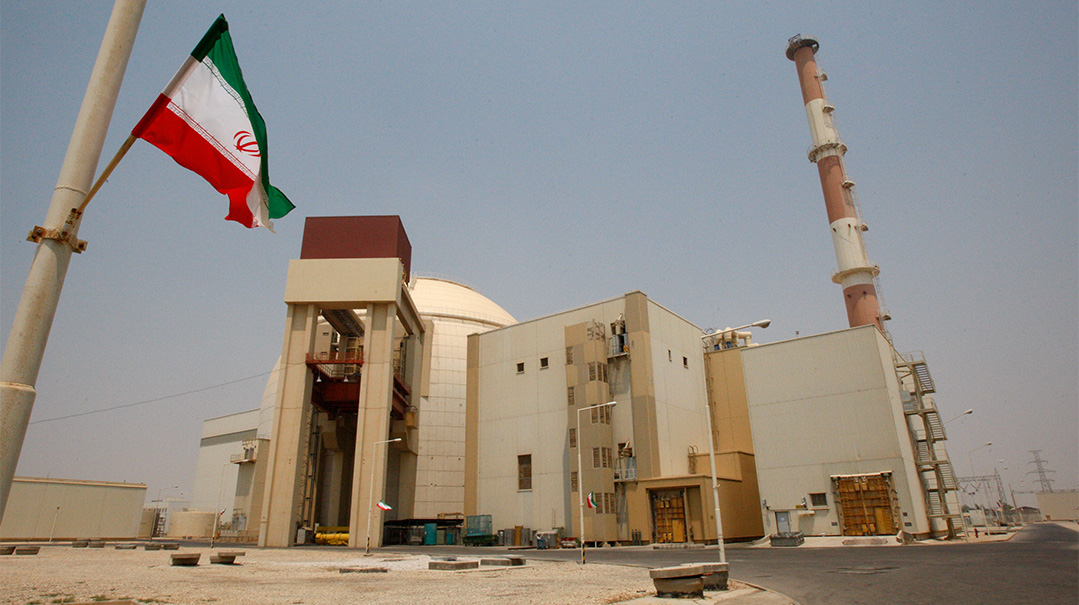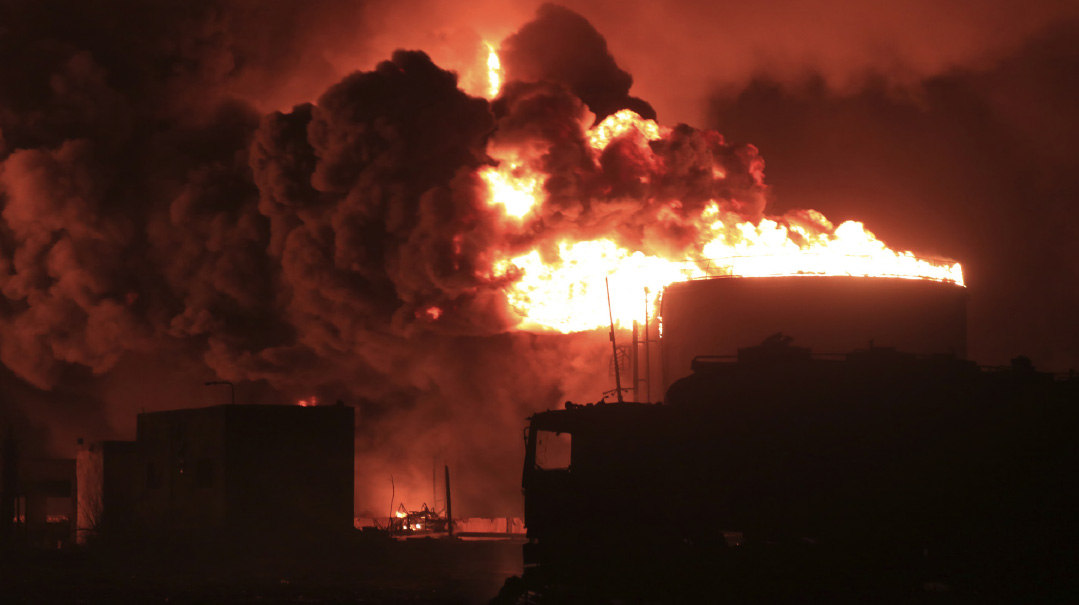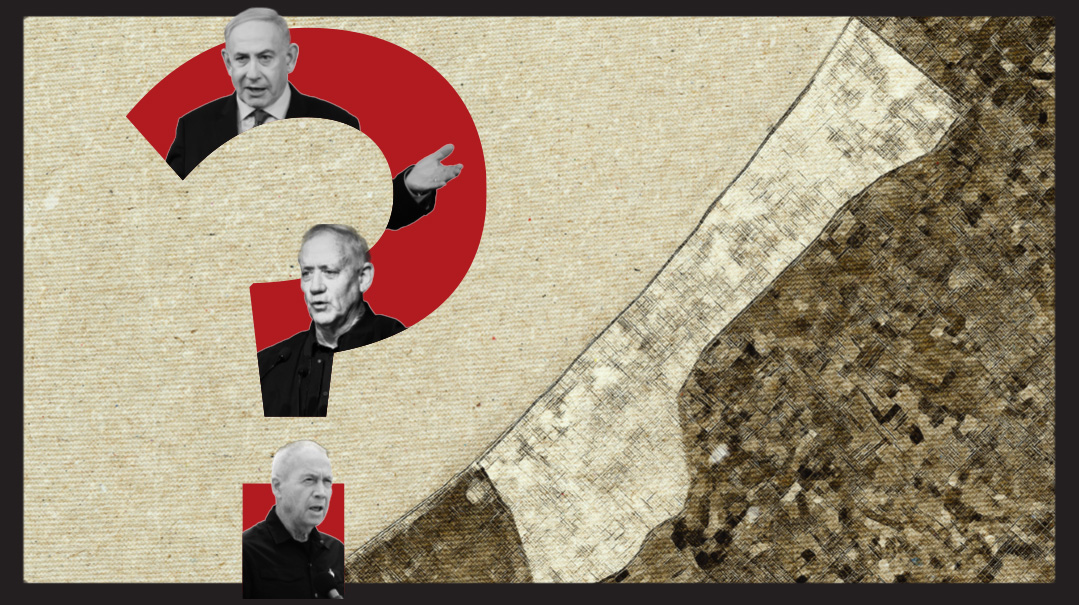Thirsty for Revenge

Having suffered so many humiliating setbacks, Iran is now desperate for revenge against Israel

I
ran and Israel are taking the gloves off.
Until now, as Iran pressed forward on its nuclear weapons program and tried to extend its geopolitical reach through Iraq into the Levant, Israel had responded with pinpoint attacks — airstrikes against arms convoys in Syria, assassinations of nuclear scientists, mysterious explosions at Iranian military depots — all the while maintaining a low profile. Perhaps one exception to this modus operandi was the Mossad’s daring 2018 theft of Iran’s nuclear records from a Tehran warehouse, right under the noses of the regime.
Having suffered so many humiliating setbacks, Iran is now desperate for revenge against Israel. The war between Israel and Iran is being fought across five different fronts, and is now escalating. While in the past the Iranians tried to retaliate symmetrically, targeting Israeli scientists and generals, these days any Israeli — maybe any Jew — could be a target.
Thanks to excellent work by the Israeli intelligence community, the authorities were able to issue clear travel warnings for Turkey. Six attempted terrorist attacks in that country have been foiled over the past two weeks; in two of them, the Israeli targets escaped by the skin of their teeth.
The Iranians, in addition to expanding their range of targets to include civilians, have become considerably less cautious. In the past they relied on proxies, but now they’re employing their elite Quds Force directly. Iran’s leadership is under enormous pressure to notch some achievement that could pass as revenge, hitherto without success. Their desperation is such that they have even resorted to fake news, circulating reports to the effect that they fired rockets at a Mossad base in Kurdistan, something that never happened. They have also provided names of multiple Israelis they claim to have eliminated, all of which reflects their intense obsession for getting back at Israel.
The Mask Drops
Israel isn’t taking this sitting down and is in fact beginning to remove the mask, openly discussing plans against Iran. Last week Prime Minister Naftali Bennett spoke in the Knesset’s Foreign Affairs and Defense Committee of “cutting off the snake’s head.” He made clear that Israel is no longer passively retaliating but now actively initiating attacks.
This in turn drives Iranian desperation for revenge; now it’s obvious who’s responsible for the assassinations and sabotage. Many in the defense establishment oppose Israel’s acknowledgment of activities against Iran and believe that a return to the policy of ambiguity would reduce Iran’s motivation to retaliate.
But there is one clear indicator that Israel’s actions have been effective: The Iranians are highly worried by the rate at which their people are being eliminated. Over the past month alone, eight Iranian scientists in the nuclear, space, and aviation fields died suddenly, under mysterious circumstances. All were 30 to 40 years old, healthy, with no medical background, and considered brilliant in their fields. They all met their deaths either in strange explosions at Iranian Revolutionary Guard Corps facilities or through mysterious illnesses, no details of which were released. The apparent effortlessness with which foreign agents have been eliminating senior IRGC figures in broad daylight in ostensibly secure locations has drawn international attention.
“The perpetrators’ daring is driving the Iranians out of their minds,” Maj. Gen. (res.) Amos Yadlin tells me. “They haven’t gotten over the assassination of their lead nuclear scientist Mohsen Fakhrizadeh in 2020, and now it’s happening again, in the heart of Tehran.”
Diplomatic Dance
Meanwhile, the international community is going through the motions to stop Iran’s march to a bomb. At the initiative of the United States, the UK, France, and Germany, the International Atomic Energy Agency (IAEA) passed a resolution last week calling on Iran to cooperate with the agency, with a broad hint that refusal would lead to the matter being referred to the UN Security Council.
Pressure is being brought to bear on Iran to provide details on the nuclear facilities exposed by Israel’s 2018 theft of Iran’s nuclear archives. Traces of processed uranium have been found at all three sites under IAEA inspection, and Iran refuses to provide any information about the nuclear activities performed there, the amount of uranium used, or where that uranium is today. Iran’s failure to even declare these facilities or the activities taking place there put it in violation of the Non-Proliferation Treaty (NPT) — especially as the knowledge it gained through its experiments at these sites may be key to their efforts to turn enriched uranium into a bomb.
At the same time, an absurd dance has started in which, just as Iran is brazenly violating the NPT, the US is trying to persuade it to return to a revised JCPOA. The Americans and Europeans are hoping to revive a deal based on the understandings reached in March 2022, and to get the Iranians to withdraw their demands for relief from sanctions unrelated to the nuclear project.
The Biden administration is playing it very low-key on the importance of getting a deal better than the dangerous one that Trump pulled out of in May 2018, and isn’t making any explicit threats as to what will happen if the Iranians just keep running out the clock until they build their first four to six bombs. The most threatening signals the US is sending are patrols by heavy bombers in the Persian Gulf and military exercises with Israel designed to improve the IAF’s ability to target Iranian nuclear infrastructure.
The Window Closes
The diplomatic moves, unsurprisingly, have had little effect. The IAEA resolution against Iran last week led the Iranians to instantly shut off 27 IAEA cameras at their nuclear facilities. Now they’re considering further provocative steps, such as upping uranium enrichment to 90 percent or withdrawing from the NPT altogether. There’s also fear that they might transfer highly enriched uranium to secret facilities for experimentation and weapon grade enrichment, without the IAEA’s knowledge.
By doing this, Iran hopes to cut down its time frame for transforming weapon-grade uranium into a bomb, thereby crossing the nuclear threshold; until it does so, it remains vulnerable to Israeli and international efforts to derail its nuclear ambitions.
In connection with this, the Iranians have made progress in converting enriched uranium from gaseous form back to metallic form. And unlike before, when they were only able to convert 20 percent enriched uranium, they’re now replicating the process with 60 percent enriched uranium. According to a German intelligence report, the Iranians have also stepped up acquisition of materials necessary for their nuclear project.
But that is not the only front on which Tehran is pressing its advance. Iran is stepping up its military entrenchment in Syria and upgrade of Hezbollah’s capabilities, while at the same time increasing proxy attacks on American targets. All this is to deter Israel and the US from taking action, and improve Iranian ability to target them, if the deterrence proves ineffective. In response, air strikes attributed to Israel in Syria against Iranian weapons depots are on the rise, and Israel may have increased its activities in Iran as well.
The Biden administration’s attitude looks like a carryover of the Obama administration’s willingness to offer concessions in pursuit of a deal — any deal. Many Biden appointees are Obama alums who were involved in crafting the JCPOA. Like Obama, who stopped the campaign to shut down Hezbollah’s international drug-dealing and crime network, the current administration has also tried to appease the Iranians with moves like removing the Houthis from the terror blacklist in February 2021, and lifting sanctions on civilian aspects of the nuclear project this February, without getting anything in exchange.
Although there have been encouraging signals from Washington, such as the sanctioning of Hezbollah’s financing network, and the ultimate decision not to remove the Revolutionary Guards from the terror blacklist, it seems there’s still no change in the overall policy of appeasement.
(Originally featured in Mishpacha, Issue 916)
Oops! We could not locate your form.







